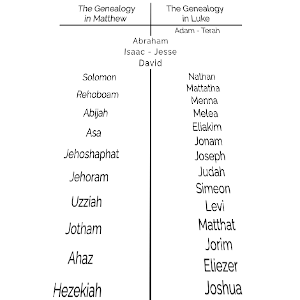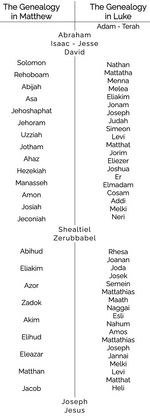excreationist
Married mouth-breather
Here is an excerpt from a book I wrote:

There are a few prophecies the genealogies fulfil (Messiah would be a descendent of Abraham, King David, and governor Zerubbabel and his father Shealtiel) and besides that the genealogies are mostly different and contradictory. I mean they don't even agree which son of David Joseph was descended from or who was the father of Shealtiel or the son of Zerubbabel or the father of Joseph.

The prophecies:

There are a few prophecies the genealogies fulfil (Messiah would be a descendent of Abraham, King David, and governor Zerubbabel and his father Shealtiel) and besides that the genealogies are mostly different and contradictory. I mean they don't even agree which son of David Joseph was descended from or who was the father of Shealtiel or the son of Zerubbabel or the father of Joseph.

The prophecies:
More:The Messiah would be a descendent of Abraham (Genesis 12:3, 22:18, Acts 3:25-26)
The Messiah would be a descendent of King David (2 Samuel 7:12-16, Psalm 89:3-4, Isaiah 9:7)
The Messiah would be a descendent of the governor Zerubbabel and his father Shealtiel (Haggai 2:23)
Joseph and King David
In Matthew 1:20 and Luke 1:27, Joseph is said to be a descendent of King David. This is shown in the genealogies in Matthew and Luke. While they agree about the ancestors of David, they almost entirely disagree about the ancestors of Joseph after David. The exception to this is that both mention Zerubbabel, a governor who rebuilt the temple in Jerusalem, and his father Shealtiel. They disagree on who Shealtiel's father was, though they agree that he is a descendent of David.
Why are the genealogies different?
The earliest tradition that explained the differences in the genealogies involved the concept of levirate marriage. This idea was mentioned in the 3rd century AD by Sextus Julius Africanus in "Epistle to Aristides". In that version, Matthew talked about Joseph's natural father while Luke talked about Joseph's legal father.
Centuries later, John of Damascus, who lived from 675 - 749 AD, was unhappy with that explanation and argued that the genealogy in Luke was actually showing that Mary was descended from David. Though the Bible doesn't suggest that Mary is a descendent of David, Luke says that her relative, Elizabeth, is a descendent of Moses' brother, Aaron (who isn't an ancestor of David). Despite this, the idea that Mary was a descendent of David is the most popular explanation today amongst Christians.
Another possibility is that at least one of the genealogies isn't accurate and may even have been deliberately invented.



